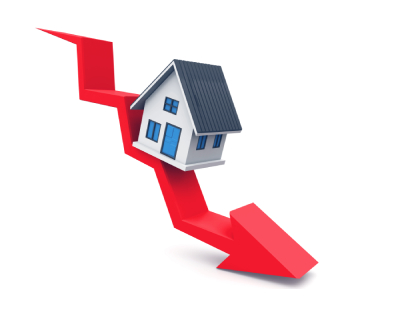
The average UK house price fell slightly in June, by around £300 compared to May with a typical property now costing £285,932.
This was the third consecutive monthly fall, albeit it a modest one - however, the annual drop of 2.6 per cent, equivalent to some £7,500 on a typical home, is the largest year-on-year decrease since June 2011, and was larger than many analysts expected.
These figures come from the Halifax which says that with very little movement in house prices over recent months, this sharp annual decline largely reflects the impact of historically high house prices last summer – annual growth peaked at 12.5 per cent in June 2022 – supported by the temporary Stamp Duty cut.
Kim Kinnaird, director of Halifax Mortgages, says: “To some extent the annual growth figure also masks the fluctuations we’ve seen in the market over the past 12 months. Average house prices are actually up by 1.5 per cent or £4,000 so far this year, with most of that growth coming in the first quarter, following the sharp fall in prices we saw at the end of last year in the aftermath of the mini-budget.
“These latest figures do suggest a degree of stability in the face of economic uncertainty, and the volume of mortgage applications held up well throughout June, particularly from first-time buyers. That said the housing market remains sensitive to volatility in borrowing costs.
“Concerns about persistent inflation have led to a significant increase in the cost of funding. Coupled with base rate rising by another 0.5 per cent, this contributed to a big jump in typical mortgage rates over the last month."
She continues: “The resulting squeeze on affordability will inevitably act as a brake on demand, as buyers consider what they can realistically afford to offer. While there’s always a lag effect when rates go up, many existing mortgage holders with variable deals or rolling off fixed rates will likely face an increase in the next year.
“How deep or persistent the downturn in house prices will be remains hard to predict. Consumer price inflation is likely to come down in the near term as energy and food prices look set to reverse their steep rises, but core inflation is clearly proving stickier than originally expected.
“With markets now forecasting a peak in Bank Rate of over 6.0 per cent, the likelihood is that mortgage rates will remain higher for longer, and the squeeze on household finances will continue to put downward pressure on house prices over the coming year.”
We're excited to announce that we're working on building a shiny new website for readers of Landlord Today! As part of this process, commenting on articles will be temporarily disabled. We look forward to sharing our new and improved Landlord Today website with you shortly!









.png)

(1).png)





